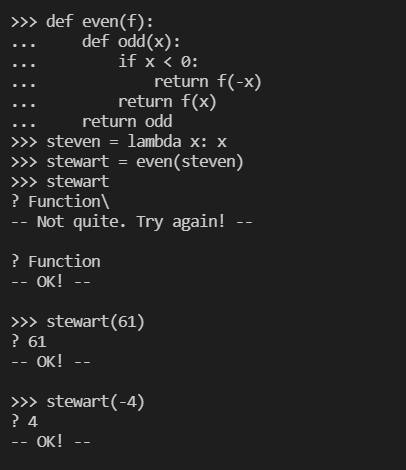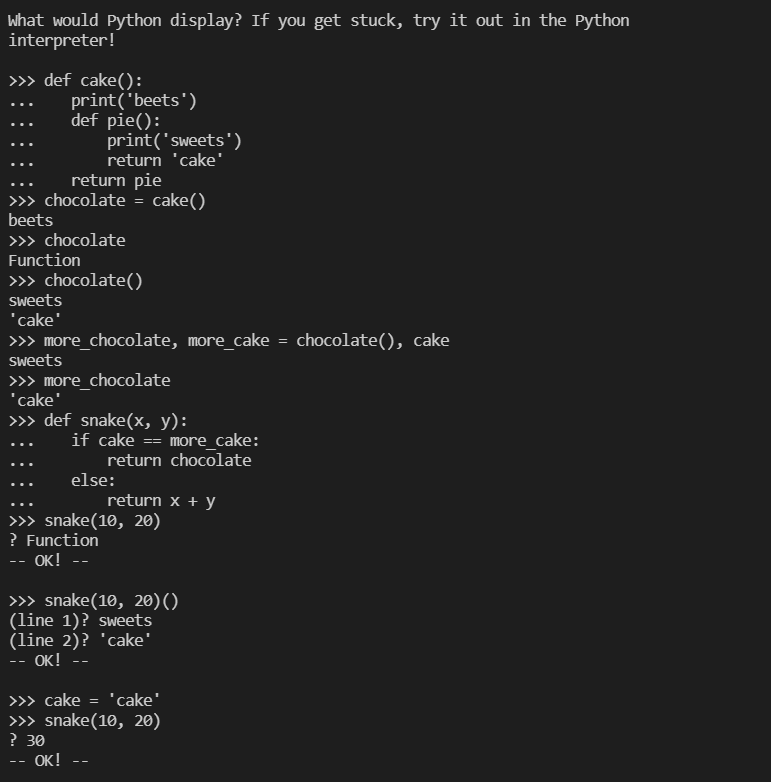cs61a 2020fall lab2
网址 https://inst.eecs.berkeley.edu/~cs61a/fa20/lab/lab02/
Problem1:
test如果不会可以用python解释器运行一遍试一下,注意 Function Error nothing都可以是答案
def lambda_curry2(func):
"""
Returns a Curried version of a two-argument function FUNC.
>>> from operator import add, mul, mod
>>> curried_add = lambda_curry2(add)
>>> add_three = curried_add(3)
>>> add_three(5)
8
>>> curried_mul = lambda_curry2(mul)
>>> mul_5 = curried_mul(5)
>>> mul_5(42)
210
>>> lambda_curry2(mod)(123)(10)
3
"""
"*** YOUR CODE HERE ***"
def curry(avg):
a = func(avg)
return a
return curry
Problem2:
部分test:


Problem4:
def count_cond(condition):
"""Returns a function with one parameter N that counts all the numbers from
1 to N that satisfy the two-argument predicate function Condition, where
the first argument for Condition is N and the second argument is the
number from 1 to N.
>>> count_factors = count_cond(lambda n, i: n % i == 0)
>>> count_factors(2) # 1, 2
2
>>> count_factors(4) # 1, 2, 4
3
>>> count_factors(12) # 1, 2, 3, 4, 6, 12
6
>>> is_prime = lambda n, i: count_factors(i) == 2
>>> count_primes = count_cond(is_prime)
>>> count_primes(2) # 2
1
>>> count_primes(3) # 2, 3
2
>>> count_primes(4) # 2, 3
2
>>> count_primes(5) # 2, 3, 5
3
>>> count_primes(20) # 2, 3, 5, 7, 11, 13, 17, 19
8
"""
"*** YOUR CODE HERE ***"
def cond(n):
count = 0
for i in range(1, n+1):
if condition(n, i):
count += 1
return count
return cond
Problem7:没什么难度
def composite_identity(f, g):
"""
Return a function with one parameter x that returns True if f(g(x)) is
equal to g(f(x)). You can assume the result of g(x) is a valid input for f
and vice versa.
>>> add_one = lambda x: x + 1 # adds one to x
>>> square = lambda x: x**2
>>> b1 = composite_identity(square, add_one)
>>> b1(0) # (0 + 1)^2 == 0^2 + 1
True
>>> b1(4) # (4 + 1)^2 != 4^2 + 1
False
"""
"*** YOUR CODE HERE ***"
def k(a):
if compose1(f,g)(a) == compose1(g, f)(a):
return True
else:
return False
return k
Problem8:弄清楚传进来的参数具体用在那个函数就可以了
def cycle(f1, f2, f3):
"""Returns a function that is itself a higher-order function.
>>> def add1(x):
... return x + 1
>>> def times2(x):
... return x * 2
>>> def add3(x):
... return x + 3
>>> my_cycle = cycle(add1, times2, add3)
>>> identity = my_cycle(0)
>>> identity(5)
5
>>> add_one_then_double = my_cycle(2)
>>> add_one_then_double(1)
4
>>> do_all_functions = my_cycle(3)
>>> do_all_functions(2)
9
>>> do_more_than_a_cycle = my_cycle(4)
>>> do_more_than_a_cycle(2)
10
>>> do_two_cycles = my_cycle(6)
>>> do_two_cycles(1)
19
"""
"*** YOUR CODE HERE ***"
fun = [f1, f2, f3]
def k(n):
def f(avg):
for i in range(0,n):
num = i % 3
avg = fun[num ](avg)
return avg
return f
return k



 浙公网安备 33010602011771号
浙公网安备 33010602011771号